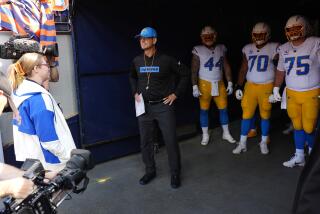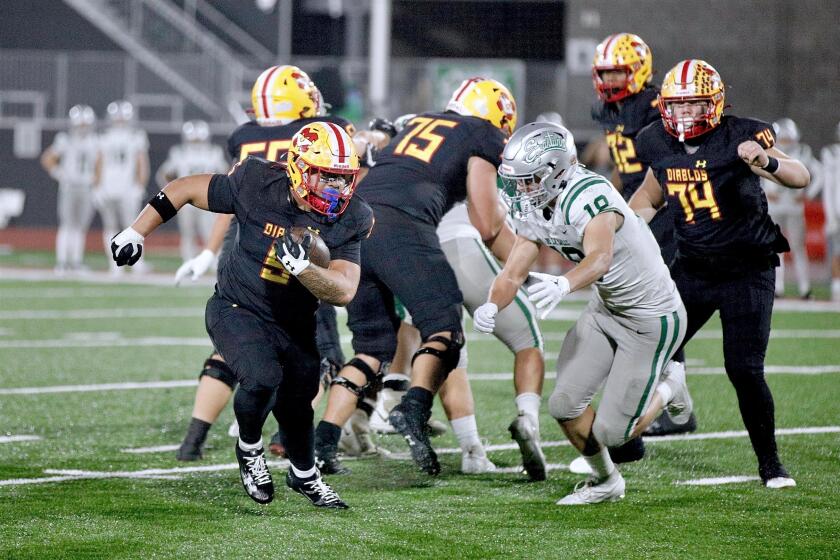JUST PREPS: A page dedicated to high school athletes, their families and coaches--and to those who follow high school sports : Burning Desire, or Total Burnout?
Dave Endow remembers when Dick Vermeil stepped down as coach of the Philadelphia Eagles.
“When he resigned, you could see the strain on his face,” said Endow, who resigned as Roosevelt High’s football coach after 22 years. “Then you look at the guys on TV, they look like they are having a good time. When those guys, like Mike Ditka, were coaching, you could see the strain. Now [as TV personalities] they look happy.”
The catch-phrase for what happened to Vermeil is burned out.
Twelve years ago, when Vermeil quit coaching the Eagles, he said:
“I am emotionally burned out. I’m going to take my own advice and step down from coaching. I think it’s best for me, my family and in the best interest of the players.”
He was well paid, with other job prospects. It’s not that way with most high school teachers and coaches.
Bob Rotella, director of the Sports Psychology Program at the University of Virginia, says that some coaches’ burnout is inevitable.
“Usually the kind of coaches that burn out have a single-minded orientation, a sleep-in-the-office-four-days-a-week, all-consuming approach to the job,” Rotella said. “You see some coaches, who say, ‘That was my plan. I wanted to be totally immersed.’ But the problem is, in college or high school, there isn’t some place to go like Dick Vermeil did.”
Endow’s reasons for quitting at 47 sound familiar.
“One reason would be burnout,” he said. “I wasn’t seeing progress made by the efforts of both coaches and players. With my leadership, I felt we weren’t getting anywhere. I don’t even have a winning record, but we always prided ourselves on [playing with] the greatest of heart. Not giving up was gratifying.
“In 1990 our team was 1-8 but the effort was there. The last few years, it’s been an effort. When the going got tough, we didn’t get going.”
So Endow did.
Two years ago he announced that he would give two more seasons to the job so there could be a smooth transition to a new coach.
Over 22 seasons, there were plenty of reasons to leave: the politics of coaching and teaching, a playing field whose end-zone is cut short by the running track and is largely bereft of grass, the lack of stands, bad lighting, bad locker rooms, sub-par weight room.
None of those things caused Endow to quit.
“I used to enjoy coming to school to teach and coach,” he said. “But toward the end, I started living for the weekend. When it’s not fun, it’s time to get out. I wasn’t happy to have the game on Friday. My blood pressure was up. Now my health is better. Right now I want to improve my golf game, buy a computer and learn to use it.
“I’m taking a couple years off to reevaluate. Right now my thinking is that I don’t want to be a head coach because I’m committed and willing to work seven days a week when I am a coach.”
And that has become too much.
*
It wasn’t supposed to happen to John Rice.
He had been to thousands of wrestling meets. He wrestled for the Marines. He had been through enough tournaments in 18 years at Indio High that a dual meet shouldn’t cause the uneasiness in his chest.
It couldn’t be my heart. I eat right. I work out with my wrestlers. Heck, I can still beat many of them and I’m in my late 40s.
But it was real.
“It felt like someone was putting daggers in my chest,” Rice said. “In ‘91, I went to the heart doctor. He said ‘You ought to consider changing your lifestyle. . . .’ ”
It was the lifestyle of a coach who cared too much.
Rice had developed angina--a condition marked by chest pain caused by a decrease of blood to the heart--and he attributed that to the pressure of total commitment to his coaching and teaching and high standards he set for himself.
It wasn’t the pressure of a dual meet. It was the pressure of life.
“I think every head coach knows what is involved when they take the job,” said Don Nichols, who after last season stepped down as head basketball coach at Norte Vista and became an assistant. “You have to commit your life. I gave it six years. I wasn’t tired or burned out or anything, but your kids are only young once.”
Call it burnout prevention.
Or getting a life back.
Rice coaches the frosh-soph wrestling team at Indio. He still gives up his planning period for an extra hour of coaching every day, and he still gives it his all during the season. But now he can enjoy--even anticipate--the changing seasons because he isn’t in the mini-gym.
He sees and enjoys his family more. He even enjoys coaching more.
Mike Vanta, who was a head basketball coach and now is an assistant at Riverside Poly, understands.
“Hey, I was just intense,” he says. “You can ask anyone here what I was like. For 22 years, I was thinking basketball 12 months a year. I wanted kids who played for me to know basketball--that it was fun. I wanted them to have the whole experience the way it should be. I mean, how many kids go on to play at a higher level?”
And Vanta would still be a head coach but for circumstances.
He had left Poly’s team last year to become coach at Cal Baptist College, though he retained his Poly teaching job.
Then he quit at Cal Baptist because the two jobs consumed too much time and he was concerned that his children might grow up without him.
“That was going to be my life for three solid years,” he said. “My son Mark is a senior, my daughter is a sophomore and that’s all I have left. Once I stepped back, I realized all the time away.”
He wasn’t the only one.
“I talked to a coach--he coached for about 20 years--who encouraged me,” said Nichols of his decision to step down. “He said, ‘Sometimes you coach 20 years of blood, sweat and tears and for what?’ ”
It’s not the money. No stipend covers the extra hours and probably either goes right back into the program or in helping volunteer assistants.
“You’re putting in serious time for no money,” is the way Vanta puts it.
*
The irony is that burnout doesn’t happen to all coaches, and when it does, it doesn’t necessarily kill the desire to coach.
That’s why Norco’s Gary Campbell, who has coached football for 27 years, says they will have to drag him away from the profession.
“Do I still love coaching? Oh, God, yes,” Campbell said. “Even if I wasn’t the varsity coach, I would want to coach at the lower levels. I’ll want to coach the rest of my life.”
Campbell also said that he avoided burnout by learning to split up time and responsibilities with his assistants and to trust them to do their jobs. He also makes a point of relaxing in the off-season.
Some, like Rice, have gone to lower levels and regained their enthusiasm. Others have become assistants at the programs they once headed.
“I would say I enjoy [coaching freshmen and sophomores] more than coaching the older boys,” Rice said. “To the younger kids, it’s all new and something they’ve never seen. It’s not, ‘Oh coach, do we have to drill the left leg again?’ The younger kids are much more thankful.
“They’ll do the simplest technique and thank you two or three times. You almost feel like a father figure sometimes.”
The competitiveness, the teaching, those things are still there, but the angina is gone.
The down-side, Vanta says, is “you miss not being in control. So you don’t think about it. You try to help in any way you can.”
Others merely suppress the desire to coach again, though there may be no escape.
“I’ve had comments from teachers [who do not coach], and they talk about burnout,” Endow said. “It can happen anywhere where your expectations are not being met.”
More to Read
Get our high school sports newsletter
Prep Rally is devoted to the SoCal high school sports experience, bringing you scores, stories and a behind-the-scenes look at what makes prep sports so popular.
You may occasionally receive promotional content from the Los Angeles Times.






